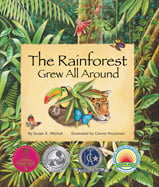Alignment to Standards for ND

| Grade | Number | Standard |
|---|---|---|
| 1 | SC-1.1.3 | Describe different ways that things can change (e.g., size, mass, color, movement) |
| 2 | SC-2.3.4. | Describe an objectês location (e.g., further than, beside, under, over) relative to another object |
| 2 | SC-2.4.2. | Identify various things that are found in different environments (e.g., cactus, lizard _ desert; shark, coral- ocean) |
| 3 | SC-3.1.1. | Identify changes that are repetitive (e.g., seasons, day and night, water cycle) |
| 3 | SC-3.4.1.¾ | Identify parts of an organism that have specific functions (e.g., roots absorb water, heart pumps blood) |
| 3 | SC-3.4.2. | life cycles of plants and animals (e.g., birds, mammals, grasses, trees, insects, flowers) |
| 4 | SC-4.4.1. | Classify plants and animals according to common physical characteristics |
| 4 | SC-4.4.2. | Identify adaptations that help plants and animals survive and grow in their environment |
| 4 | SC-4.4.3. | Identify behaviors of animals as instinctive or learned |
| 4 | SC-4.4.4. | Identify ways that an organismês pattern of behavior is related to the nature of the organismês environment |
| 5 | SC-5.5.5. | Identify the objects in the sky that have predictable patterns of movement (e.g., sun, planets, moons, stars) |
| 5 | SC-5.7.2. | Explain ways humans benefit from Earthês resources (e.g., air, water, soil, food, fuel, building materials) |
| K | SC-K.3.1. | Identify the materials that make up an object: rubber, and plastic) |